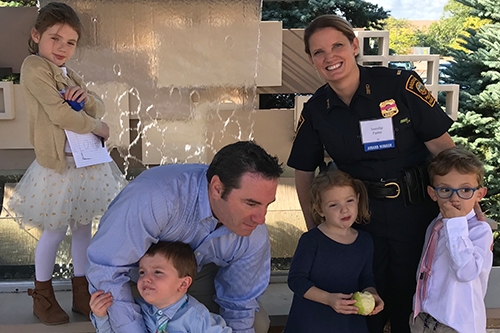Jennifer Canney Paster ’98 majored in sociology and minored in psychology at Union before earning an M.S. in criminal justice administration from Western New England University. She is the second woman in the history of the Brookline (Mass.) Police Department to attain the rank of lieutenant. Head of the department’s Crisis Intervention Team, she oversees a relatively new approach to responding to people with mental health concerns. CIT officers are trained to deescalate situations and, when applicable, direct people into treatment instead of jail. Jennifer also helped form the Autism and Law Enforcement Coalition to foster deeper understanding of autism spectrum disorders among law enforcement. She teaches Rape Aggression Defense courses and is a member of the Massachusetts Association of Women in Law Enforcement and the National Association for Women Law Enforcement Executives.
What are the most challenging and rewarding aspects of your career or volunteer activities?
I feel really lucky to be able to live and work in the town where I grew up. My job allows me to give back to the community in a very direct way. One of the challenges today is communicating to the community that the majority of the people I work with took this job so they could give back and help others. Law enforcement isn’t always portrayed in the best light in the media, and I think the good work our officers are doing gets buried behind the far less frequent, but higher profile, negative events.
Who inspired/inspires you, both professionally and personally?
There are really so many people. My parents were by far the most influential people in my life, and losing them both to cancer in the past few years has been devastating, but I will continue to try to honor them by helping others. At Union, Professor Martha Huggins was a strong mentor and an inspiration, as was Professor Michelle Paludi. Superintendent Lisa Holmes from the Boston PD has been an incredible mentor to me. When there were no females in ranks above me in my own agency she was willing to take my calls and give me guidance that was always exactly what I needed. I am also very fortunate to have many coworkers and a current chief for whom I have a tremendous amount of respect. I think it’s important to remember that you don’t always have to look “up” for inspiration.
What advice would you offer today’s women students, not just at Union, but across the country?
Keep your girlfriends who work outside of your profession; make those relationships a priority. I probably would not have emphasized this as much 20 years ago, but I certainly do now. There are certain experiences that you just can’t share with your guy friends, no matter how close or how great they are. I rely on my “Union girls” (the name of our million-text-long chain) more than they will ever know. Recently, we all attended the Bat Mitzvah of one of our Union girlfriends, and it was like we were right back at Geppetto’s (without the sticky floors).
What was your most formative experience at Union?
As part of my senior thesis, I went on ride-alongs with the Schenectady Police Department to study police decision making and discretion for my senior thesis. At the time I would never have considered a career in law enforcement for myself, but I think I instantly became addicted to the excitement of responding to emergencies and being able to help people when they needed it the most. My senior thesis is sitting on the shelf in my office next to my law books, just to remind myself of how a 20-year-old me saw not only my profession, but the world at the time.
